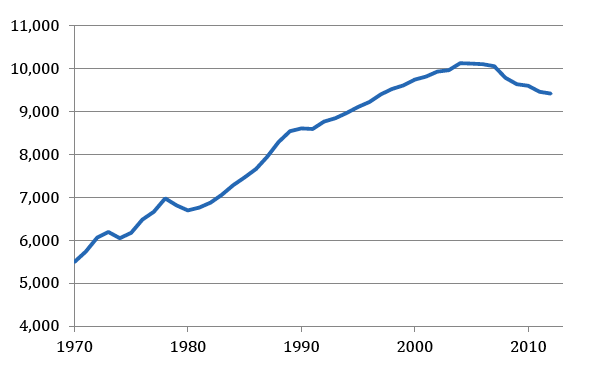For a long time in the United States, driving activity moved in step with the economy. Since economic growth was fairly steady, consistent growth in driving was built into all the traffic modeling the engineers used to plan and build streets and transportation infrastructure.

But now per capita driving has declined eight straight years in America. Total vehicle miles traveled (VMT) hasn't really budged in five years, and remains below its peak. A number of things have fundamentally changed since the time when you could chart driving behavior into the future using an upward line, according to a new paper by the State Smart Transportation Initiative, a think-tank based out of the University of Wisconsin which counts 19 state DOTs among its partners.
SSTI rejects the idea that driving declines reflect the recent recession, noting that the current slump began in 2004, well before the recession started. Driving activity actually began to decouple from economic growth in 2000, SSTI says, and today they do not appear to be strongly related.
The reasons for the current decline, SSTI reports, are broad cultural and economic trends that are likely to be "permanent," or "remain in effect for a generation or more."
In the decades prior, driving increases were triggered by factors like rising household income and auto ownership rates, increasing participation in the workforce by women, and the swelling ranks of Baby Boomers in their most active driving years. Today, however, those trends have abated or are moving in the opposite direction.
Baby Boomers are beginning to retire, and entering a stage in their lives when they will drive less and less. The American market for car owners is mostly saturated. Meanwhile, the growth in women's workforce participation leveled off more than 10 years ago.
Another big factor is the financial calculus of driving. The cost of owning a car has been increasing, and not just because gas isn't dirt cheap anymore. Maintaining, storing, and insuring a car has become more expensive too. High levels of congestion in many cities have also increased the delays and aggravation associated with driving.
Attitudinal shifts among younger Americans are playing a role. Mounting evidence suggests an increasing preference for transit, biking, and walking among the Millennial generation.
Finally, SSTI notes that for years driving was stimulated by policies that discouraged walkable, mixed-use development: single-use zoning and parking minimums, for example. But in some places, those policies are now being reformed.
The upshot is that driving may never increase the way it once did, SSTI reports. It's important that public institutions adjust accordingly.
As the authors say, "these trends suggest a serious need for a new approach to travel demand forecasting and transportation system design in the 21st century."





